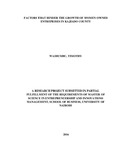| dc.description.abstract | Women-owned enterprises are now more common in developing countries such as
Kenya. Studies show that women have increased in business but most of them are only in
the small and medium enterprise sector. Many of the MSEs have grown out of self-help
groups that have been formed by women groups and youth groups’, community
organizations and other non-state actors and play a very important role in provision of
services in the county. Micro-enterprises are especially important to women since it gives
them a chance to be self-employed and also run their household chores. Women are
involved in economic activities such as promotion of education, capacity building, health,
provision of water through sinking of boreholes, construction of dams, pans and sand
dams and rehabilitating of the nutrition and disaster response. The objective of this study
was to analyze the specific factors that affect growth of the women owned. There are
many varied reason why businesses succeed and others fail. Lack of access to finance,
technology, markets and information also affect growth of enterprises. Women do not
make enough income sufficient for their households needs and therefore cannot afford
nanny care for their children. This increased demand in time between home and work
leads to lack of time for business and time to update their skills. This study adopted a
descriptive case-study research approach since it utilizes elements of quantitative
research methodologies. The descriptive research design attempted to define the factors
that slow down growth of female businesses in Kajiado County. The study utilized
primary and secondary data obtained from women groups, department of social services
and county government leaders. The study established that women owned enterprises
faced other unique challenges that are related to gender roles that are unique to different
societies. Women are the caregivers in most homes leaving less time for running
enterprises. The study recommends that more investment should be made on women
education and training which will give them more skills and also increased their chances
of building more networks in the business environment. | en_US |



